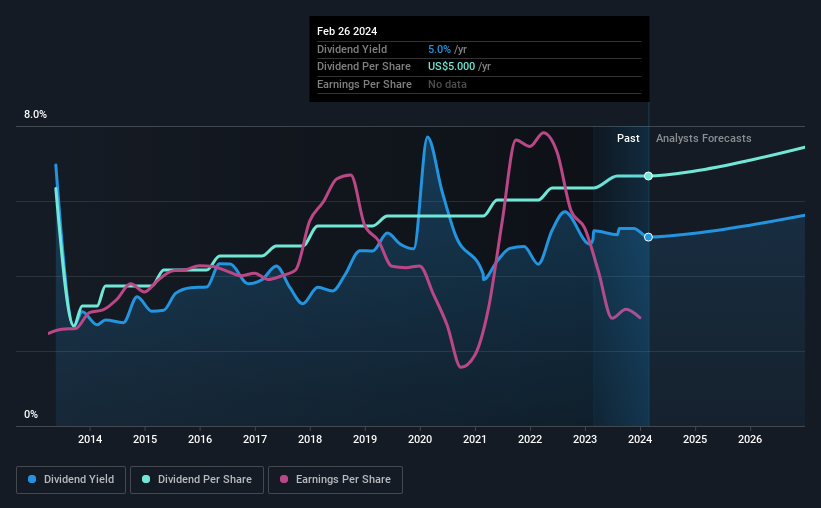LyondellBasell Industries N.V. (NYSE:LYB) Pays A US$1.25 Dividend In Just Three Days
Some investors rely on dividends for growing their wealth, and if you're one of those dividend sleuths, you might be intrigued to know that LyondellBasell Industries N.V. (NYSE:LYB) is about to go ex-dividend in just three days. The ex-dividend date is usually set to be one business day before the record date which is the cut-off date on which you must be present on the company's books as a shareholder in order to receive the dividend. The ex-dividend date is of consequence because whenever a stock is bought or sold, the trade takes at least two business day to settle. This means that investors who purchase LyondellBasell Industries' shares on or after the 1st of March will not receive the dividend, which will be paid on the 11th of March.
The company's next dividend payment will be US$1.25 per share. Last year, in total, the company distributed US$5.00 to shareholders. Last year's total dividend payments show that LyondellBasell Industries has a trailing yield of 5.0% on the current share price of US$99.27. Dividends are a major contributor to investment returns for long term holders, but only if the dividend continues to be paid. So we need to check whether the dividend payments are covered, and if earnings are growing.
See our latest analysis for LyondellBasell Industries
If a company pays out more in dividends than it earned, then the dividend might become unsustainable - hardly an ideal situation. It paid out 76% of its earnings as dividends last year, which is not unreasonable, but limits reinvestment in the business and leaves the dividend vulnerable to a business downturn. It could become a concern if earnings started to decline. Yet cash flows are even more important than profits for assessing a dividend, so we need to see if the company generated enough cash to pay its distribution. It distributed 47% of its free cash flow as dividends, a comfortable payout level for most companies.
It's positive to see that LyondellBasell Industries's dividend is covered by both profits and cash flow, since this is generally a sign that the dividend is sustainable, and a lower payout ratio usually suggests a greater margin of safety before the dividend gets cut.
Click here to see the company's payout ratio, plus analyst estimates of its future dividends.
Have Earnings And Dividends Been Growing?
Businesses with shrinking earnings are tricky from a dividend perspective. If business enters a downturn and the dividend is cut, the company could see its value fall precipitously. With that in mind, we're discomforted by LyondellBasell Industries's 12% per annum decline in earnings in the past five years. When earnings per share fall, the maximum amount of dividends that can be paid also falls.
Another key way to measure a company's dividend prospects is by measuring its historical rate of dividend growth. In the past 10 years, LyondellBasell Industries has increased its dividend at approximately 0.5% a year on average.
The Bottom Line
Has LyondellBasell Industries got what it takes to maintain its dividend payments? The payout ratios are within a reasonable range, implying the dividend may be sustainable. Declining earnings are a serious concern, however, and could pose a threat to the dividend in future. In summary, it's hard to get excited about LyondellBasell Industries from a dividend perspective.
So if you want to do more digging on LyondellBasell Industries, you'll find it worthwhile knowing the risks that this stock faces. In terms of investment risks, we've identified 3 warning signs with LyondellBasell Industries and understanding them should be part of your investment process.
A common investing mistake is buying the first interesting stock you see. Here you can find a full list of high-yield dividend stocks.
Have feedback on this article? Concerned about the content? Get in touch with us directly. Alternatively, email editorial-team (at) simplywallst.com.
This article by Simply Wall St is general in nature. We provide commentary based on historical data and analyst forecasts only using an unbiased methodology and our articles are not intended to be financial advice. It does not constitute a recommendation to buy or sell any stock, and does not take account of your objectives, or your financial situation. We aim to bring you long-term focused analysis driven by fundamental data. Note that our analysis may not factor in the latest price-sensitive company announcements or qualitative material. Simply Wall St has no position in any stocks mentioned.

